- The refinery had yet to begin operations
- The refinery’s maximum intended capacity of 650,000 b/d will make Nigeria self-sufficient in fuels while leaving ample for export
According to the executive director of Dangote Group, the Dangote Refinery will begin operating in October 2023, producing 370,000 barrels per day.
The refinery will initially focus on diesel and jet fuel.
According to Sahara Reporters, in an interview, the executive director provided more details about the timeline, challenges, and delays faced since the project was proposed in 2013.
He said, “Right now, we are ready to receive crude. We are just waiting for the first vessel. And so as soon as it comes in we can start.”
The 650,000 barrels per day Dangote Refinery had yet to begin operations following the August commencement date announced earlier by Aliko Dangote, President of Dangote Group.
While delivering his speech at the official commissioning of the refinery by former President Muhammadu Buhari in May, he said, “Your excellencies, distinguished guests, our first product will be in the market before the end of July or beginning of August this year.”
The refinery’s maximum intended capacity of 650,000 b/d will make Nigeria self-sufficient in fuels while leaving ample for export.
Africa’s largest producer currently imports all of its refined goods, depleting its foreign exchange reserves. However, delays and cost overruns caused many to doubt that Aliko Dangote, Africa’s richest man, would ever deliver. Meanwhile, fuel costs in Nigeria have risen since President Bola Tinubu eliminated an expensive subsidy in late May.
Although the refinery was designed to process light sweet Nigerian crude, state-owned Nigerian National Petroleum Corps, which is a shareholder in the project, cannot supply the refinery until November, Edwin said, so Dangote is buying oil from trading houses.
Vitol and Trafigura recently carried out inspections of the plant, he said.
“At the last minute [NNPC] said, ‘We have actually committed our crude on forward basis to someone else’, so immediately they don’t have the crude,” he said. This is a temporary issue, and the refinery should run on exclusively Nigerian crude by November, he said.
Edwin said the scale of the refinery meant being “solely dependent on Nigerian crude would not be advisable”, meaning the refinery can process most African crudes — apart from heavy Angolan grades — as well as Middle Eastern Arab Light and even US light tight oil
“We can even take some of the Russian grades… if the global system opens up to allow us to receive [them],” he said.
Although discussions started as far back as 2013, Edwin said Dangote only began physical construction five years ago following a string of delays and mishaps. The first plot of land in a free zone in Ogun state was ditched following potentially “disastrous” political interference, he said.
